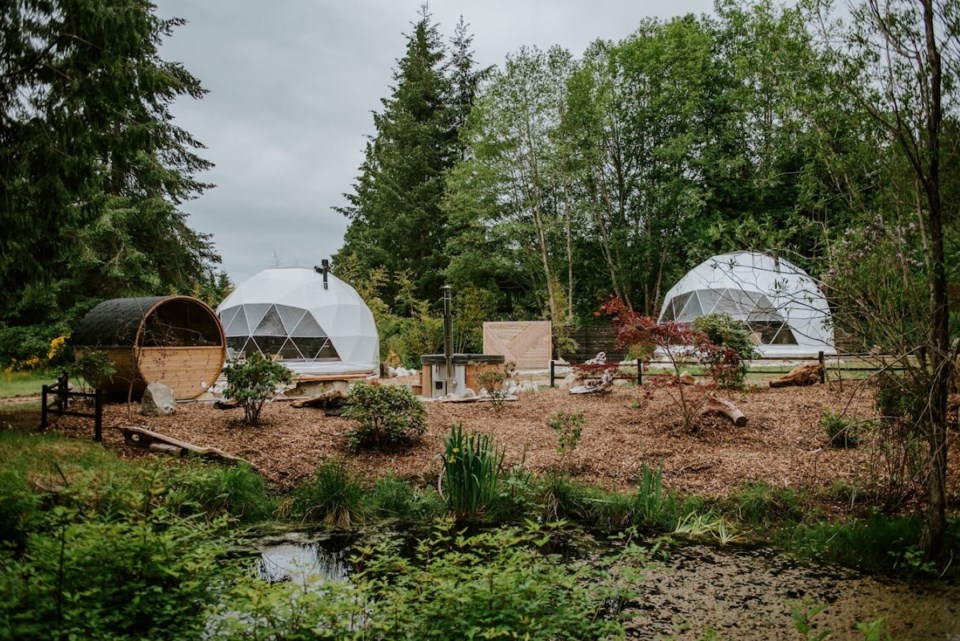Children running unattended in the street, excess water use, air-quality concerns around dust caused by traffic, the chance of possible wildfires due to a wood-burning hot tub and disregard for the spirit of the Agricultural Land Reserve (ALR), were just some of the issues brought up at a public hearing held by the District of Sechelt, Nov. 14.
The meeting was held to hear from members of the public regarding a proposal to amend the Zoning Bylaw to allow the owners of Akasha Farm at 1785 Tyson Road in ts'ukw'um (Wilson Creek) to expand their short-term agritourism accommodation from three units to five structures in place year-round, with an option to add up to five seasonal tents or RVs during warmer months.
Ian Holl, development planning manager for the district, told council the meeting was an opportunity for them to listen to comments related to the proposed amendment, which was referred to the Agricultural Land Commission (ALC) for review.
“They indicated no major objections to the proposal,” said Holl. “The agritourism accommodation is subject to provincial and local regulations... We have the rezoning application now, ultimately, if the rezoning was adopted by council, there still would be business licence application requirements and any business licence must still comply with Sechelt zoning and provincial ALR regulations as appropriate.”
Holl explained from a District of Sechelt perspective, the proposal is an opportunity to bring the operation into compliance with the Zoning Bylaw and ALR regulations in terms of neighbourhood context. He noted all of the surrounding properties are within the ALR and while the district's Official Community Plan designates all of those properties for “agriculture,” and they're all zoned AG, not all the properties have “farm class” under the BC Assessment Act.
“Here we have two levels of regulation. We've got provincial ALR regulations and our local zoning regulations. Under the provincial ALR regulations, agriculture is the primary focus. One has to establish an agricultural use first, that unlocks the ability to do agritourism activities. And establishing agritourism activities unlocks the ability to do agritourism accommodation.”
A dozen people addressed council in person, by phone or over Zoom: seven people spoke against and five spoke in favour. Of the speakers opposed, some were neighbours, while several others were concerned members of the local agricultural community.
Tyler Gray, who owns the farm, told council he and his wife have already been successfully operating four units, which are located between 130 and 250 metres from the closest neighbours, and have added a second driveway to help mitigate traffic concerns.
“Some of our neighbours fear that our business will bring disruption and increase traffic, but we believe what we're proposing is the least disruptive thing we could pursue within our ALR our rights,” said Gray. “We could build a brewery or a cidery. We could host weddings for 150 people 10 weekends of the summer and still be within our ALR rights.”
Pamela Messner, who used to live across the road from the property and who helped found the Rogue Arts Festival, held there annually since 2016, spoke against the proposal. Messner said she put a great deal of effort into getting the proper permits in place for the festival through the district and Agricultural Land Commission for non-farm use.
“I've read the package and as much as I love what they're trying to do, I don't see that the accommodation is ancillary to their farming application, their agricultural activities,” said Messner… “The regulations that were brought here were designed for large farms, over 100 acres.”
She said the week-long Rogue Arts Festival, which offers live music, art, rural-living focused workshops, vendors, interactive installations, food, drinks and camping, doesn’t include any permanent structures.
Dana Wilson told council she was part of the Smart Farm Project, which 10 years ago advocated for alternative dwellings on agricultural land. She explained it highlighted different ways people could live together and raise food.
“There's elements of that I think really echo some of the things that we're seeing in this project. The cost of land right now on the Sunshine Coast, as we all know, is absolutely incredible, and it is really difficult for young families, especially with children, to find a way to make inroads to supporting themselves and their families,” said Wilson, who noted there aren’t a lot of options on the Coast with space for events, including retreats and weddings.
“I support this project because I see a potential for gatherings, an innovative way of trying to afford the crazy property prices on the Coast. But I also hear the reservations of the neighbours." Citing familiarity with the property and respect for wanting to preserve "the beautiful creek and the land," Wilson asked, "What will be done on the property around the septic and the water usage?”
The information from the public hearing will be used by council to make a decision on the bylaw amendment application. A 233-page, online information binder regarding the proposed amendment included approximately 15 letters against and 31 in favour, besides dozens of positive online reviews.
Words missing in article? Your adblocker might be preventing hyperlinked text from appearing.



